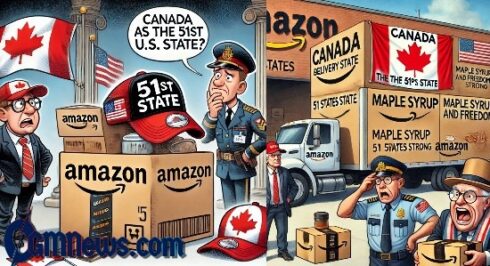A recent revelation has sparked controversy as Amazon has been found selling merchandise that promotes the idea of Canada becoming the 51st state of the United States. A quick search on the e-commerce giant’s platform reveals an array of items—including baseball caps, stickers, patches, and flags—featuring slogans such as “Canada: The 51st State” and “Maple Syrup and Freedom: 51 States Strong.” The presence of these products has raised concerns among Canadians, prompting discussions about whether the federal government has any authority to intervene.
Many Canadians have expressed frustration, questioning Amazon’s policies on what is considered appropriate for sale. While some may view these items as lighthearted novelty products or meme-inspired merchandise, their availability on a global marketplace has ignited a broader debate surrounding national identity, corporate accountability, and freedom of expression.
Reactions to the merchandise have been mixed. Some Canadians see these products as offensive and an affront to national sovereignty. For example, a letter to the editor published in OrilliaMatters condemned the items, urging Amazon to remove them and calling for collective action to protect Canada’s national pride.
Can the Canadian Government Force Amazon to Remove These Products?
The legal and political avenues available to the Canadian federal government in addressing this issue remain unclear. While Amazon does have a policy against offensive products, the company has determined that these particular items do not breach its guidelines. The policy primarily focuses on prohibiting items that incite violence or promote hate speech, and Amazon has asserted that the pro-annexation merchandise does not meet that threshold.
David Soberman, a marketing professor at the Rotman School of Management at the University of Toronto, believes that governmental intervention would likely be ineffective and could even be counterproductive. He argues that attempting to force Amazon to remove the products would generate unnecessary publicity for the sellers, increasing sales and giving them exactly the attention they seek. Instead, Soberman suggests that ignoring such merchandise is the best course of action, as it minimizes the impact and reach of the message.
Marketing Tactics and the Power of Publicity
Soberman further explains that the sale of these products is more about publicity than actual advocacy for annexation. Sellers are capitalizing on political humor, internet culture, and provocative slogans to generate media buzz. Such products are not widely popular among Canadians, and even among Americans, there is little to no serious movement advocating for Canada to become the 51st state.
Moreover, social media plays a significant role in amplifying such issues. If the government were to publicly address or attempt to ban these products, it would likely drive even more attention to them, making them viral sensations. This is a classic case of “any publicity is good publicity,” where controversial products gain traction simply because they become a topic of debate.
Amazon’s Policies and the Limits of Content Moderation
While Amazon has a responsibility to moderate content on its platform, its policies focus on clear-cut cases of harmful or offensive material. The company prohibits the sale of items that promote violence, discrimination, or hate speech, but it has determined that these pro-annexation products do not violate those standards. As a private corporation operating under U.S. law, Amazon has the right to allow the sale of products that some may find distasteful or politically charged, as long as they do not cross the line into incitement or harm.
For Canadian consumers, the best response may be to simply not engage with these products. While their presence may be unsettling to some, the lack of genuine public support for annexation suggests that the issue is more of a marketing gimmick than a real political statement. Ultimately, consumer choices dictate market trends, and if there is no demand for such merchandise, it will naturally disappear from the marketplace over time.














